Health Benefits of Expressive Writing + Tips to Get Started

In this article
Have you ever found yourself ruminating about a tough situation or negative experience when you can’t figure out how to stop thinking about it? Such thinking can distract you from your family life, interfere with work or study, prevent you from falling asleep at night, and cause you to experience constant stress.
When you just try to push emotional thoughts and feelings out of your mind, they don’t go away. By suppressing your anger, frustration, disappointment, or any other emotions, you actually let them build up, and doing it all the time can lead to serious issues later on. Instead, many people find that writing in a journal about their intense negative experiences can help them deal with and process their difficult emotions in healthy ways.
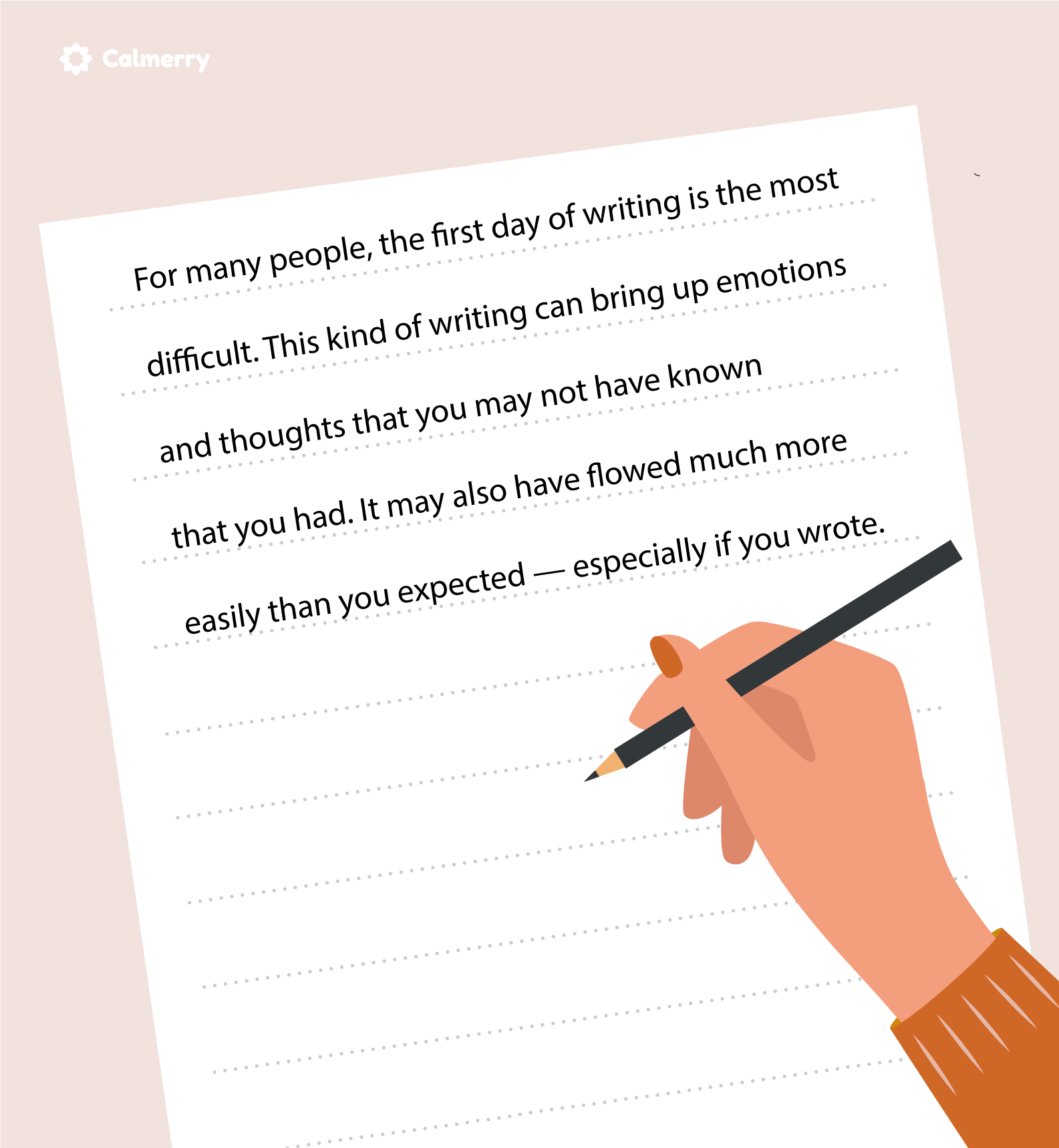
There are many different ways to journal to undercover our thoughts and feelings. But here, we’ll talk about a specific type of journaling that is called expressive writing. This simple technique helps people understand and deal with emotional upheavals in their lives. Research has shown that practicing expressive writing, coupled with supportive interventions like online talk therapy, can have a variety of benefits to our physical health, mental well-being, and our relationships.
What is expressive writing?
Expressive writing is a specific technique in which you honestly and freely reflect on a particular challenge, trauma, or a distressing experience. It’s sometimes referred to as written emotional disclosure. During short sessions of 15-20 minutes each, you need to write about your deepest feelings and thoughts related to a personally stressful life experience. You may write about the same issue or focus on different topics each day.
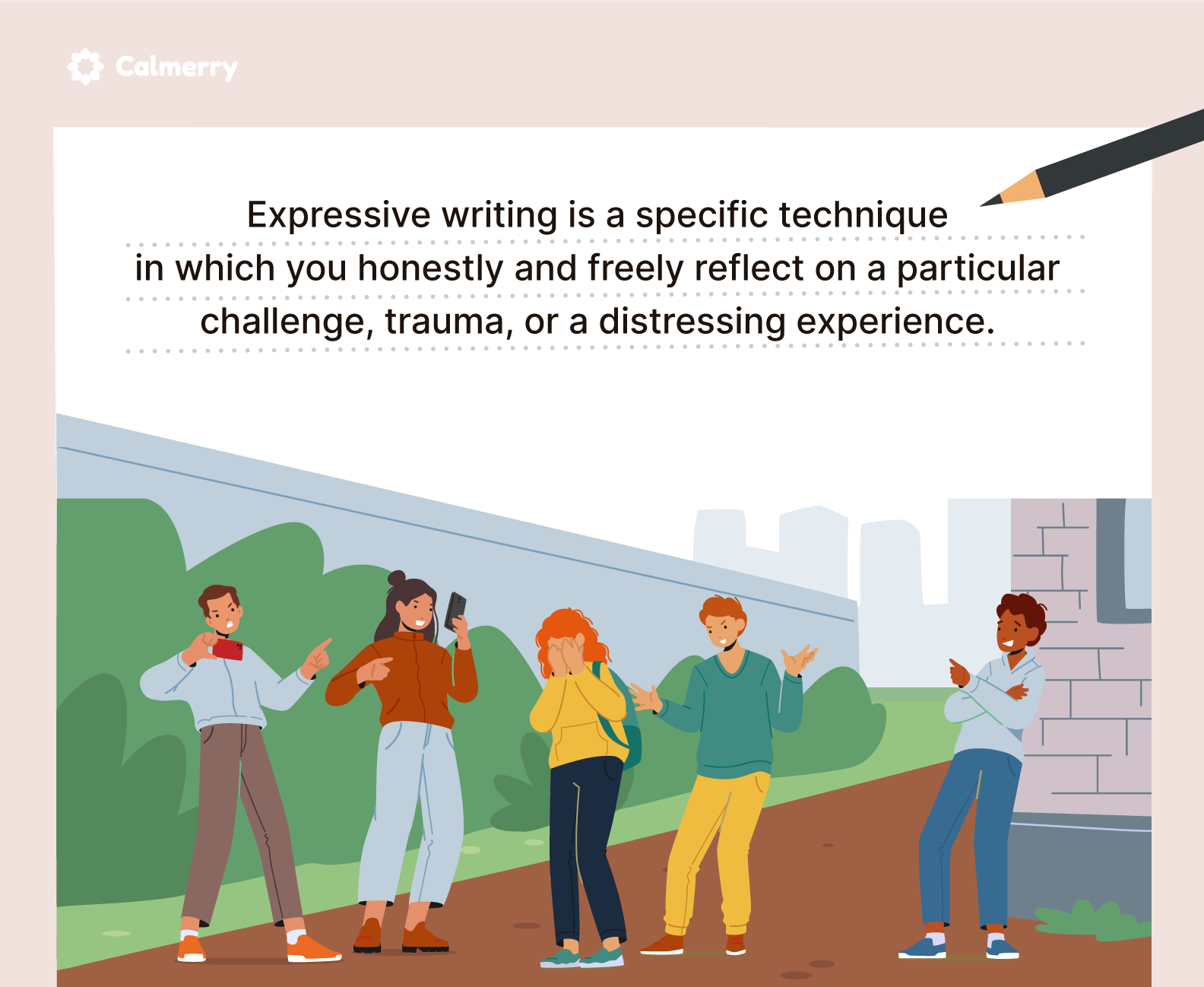
The concept of expressive writing is relatively simple. It’s deeply personal, emotional, free-flowing, and informal, often without concern for form, style, or other writing conventions like spelling, punctuation, or grammar. It involves paying more attention to feelings than memories, events, objects, or people, and that differentiates it from journaling. It’s simply expressing what’s on your mind and in your heart, so most of the time, it can be messy and unpredictable, and that’s OK.
Benefits of expressive writing
One of the earliest scientific investigations of the therapeutic effects of expressive writing was conducted in the 1980s by Dr. James Pennebaker, a psychology professor at the University of Texas at Austin with the help of Sandra Klihr Beall. They examined the effects of writing about traumatic experiences on health among college students who were randomly assigned to write either about a personal traumatic experience or a superficial topic.
In the book Opening Up by Writing It Down written by James W. Pennebaker together with Joshua M. Smyth, the authors tell that the students assigned to write about their thoughts and feelings about a trauma were told the following:
“… I want you to write continuously about the most upsetting or traumatic experience of your entire life. Don’t worry about grammar, spelling, or sentence structure. In your writing, I want you to discuss your deepest thoughts and feelings about the experience. You can write about anything you want. But whatever you choose, it should be something that has affected you very deeply. Ideally, it should be something you have not talked about with others in detail. It is critical, however, that you let yourself go and touch those deepest emotions and thoughts that you have…”
The researchers discovered that students who wrote about traumatic experiences for 4 days, 15 minutes a day, ended up going to the student health center over the next 6 months at about half the rate of students in the control condition who wrote on neutral topics. This study received a lot of attention from clinical and social psychologists. It set the precedent for researching expressive writing, and Pennebaker’s research project has been replicated many times with positive outcomes.
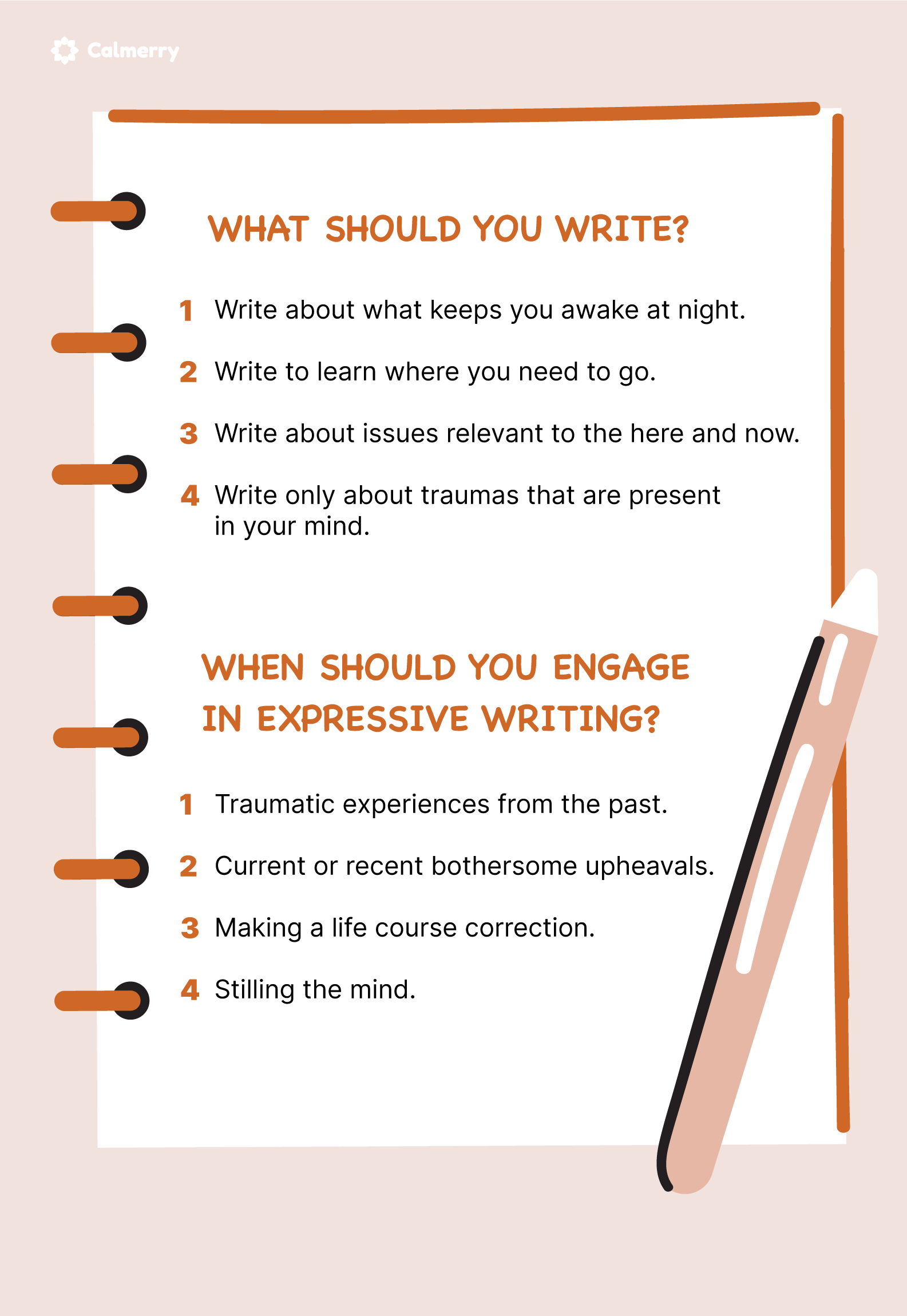
Since then, hundreds of studies over several decades have looked at the potential health benefits of this therapeutic practice for people with such illnesses as cancer, depression, PTSD, rheumatoid arthritis, and asthma. The British journal Advances in Psychiatric Treatment reports that physical and mental health outcomes of expressive writing include:
- Fewer stress-related visits to the doctor
- Improved immune system functioning
- Reduced blood pressure
- Improved lung function
- Improved liver function
- Fewer days in the hospital
- Improved mood/affect
- Feeling of greater psychological well-being
- Reduced depressive symptoms before examinations
- Fewer post-traumatic intrusion and avoidance symptoms
When it comes to enhancing psychological well-being, expressive writing has been shown to reduce symptoms of general anxiety and depression, reduce physical stress, increase resilience, and improve cognitive functioning. In addition to these concrete benefits, expressive writing can help writers find meaning in their experiences, view things from a new perspective, and experience important insights about themselves.
Researchers also examined the social effects of expressive writing. Their findings suggest that expressive writing may be particularly beneficial for people in romantic relationships. A 2006 study in the journal Psychological Science found when one partner wrote expressively about their romantic relationship, both partners began using more positive emotion words when writing each other instant messages, and the couple stayed together longer. The study also suggested that expressive writing could be used to enhance a broad range of relationships, including those in families, circles of friends, and even work groups.
The research evidence also suggests that expressive writing can help sort out complicated issues related to major life transitions. It can be helpful to write on a wide range of topics, including:
- Traumatic experiences from the past
- Current or recent minor problems such as failing an exam or fight with a family member or coworker
- Positive experiences that require rethinking who we are and where we are going, such as starting a new job, falling in love, getting married
How does expressive writing work?
So why is expressive writing so healthy? Researchers don’t completely agree on why or how writing helps. One possible explanation of why expressive writing has a positive effect on mental health is that it offers a safe way to disclose unpleasant emotions that were previously bottled up.
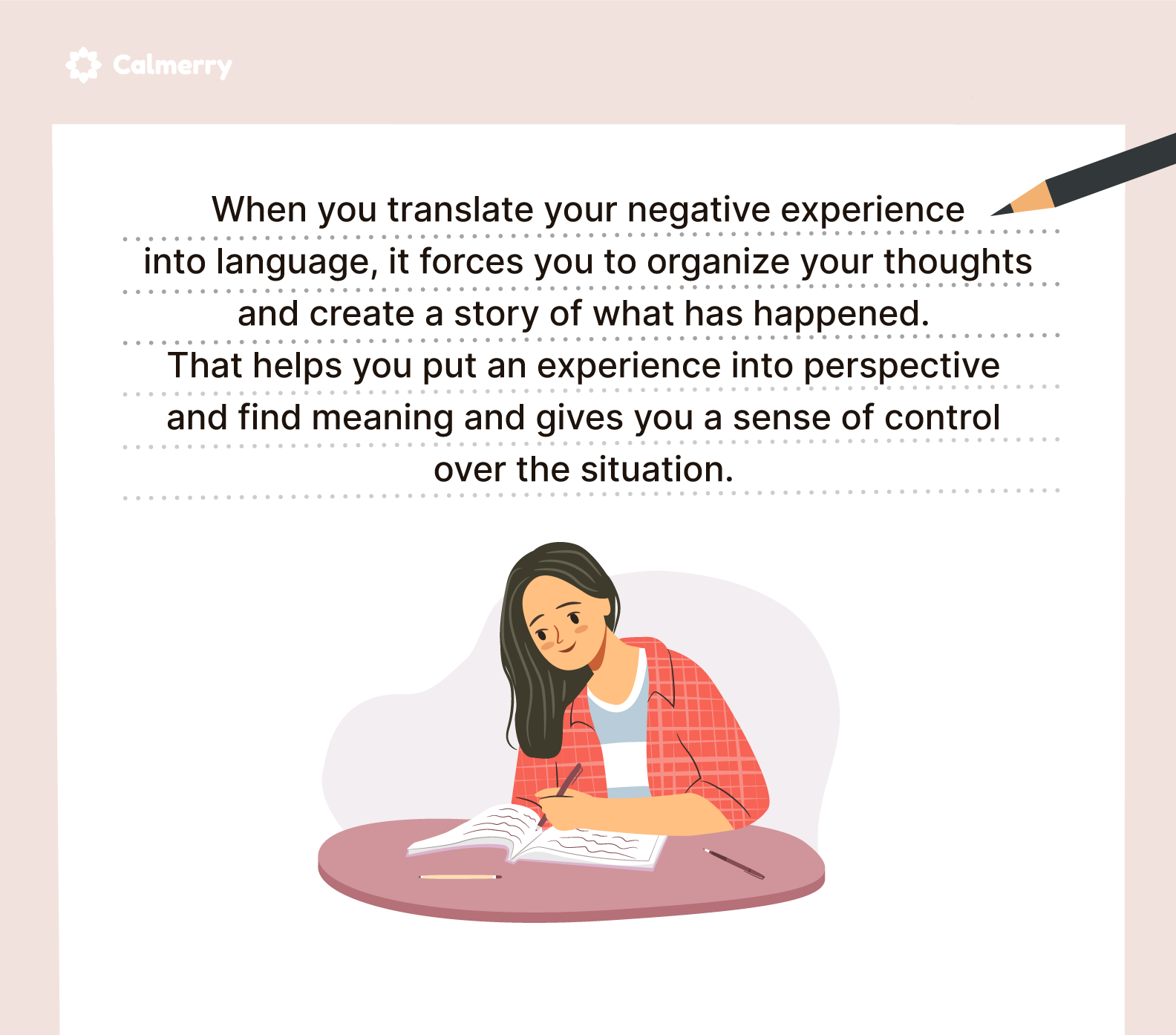
Avoiding or inhibiting these emotions can lead to psychological distress, making your body tense and your cognition impaired. And when you acknowledge, express, and process those blocked-up emotions, it reduces the physiological work of inhibition, gradually lowering the overall stress on the body, and makes you feel better.
Writing about a painful experience also allows you to identify it as a problem and uncover meaning in it. You recognize that something is bothering you. It’s an important first step to healing. Then you translate that negative experience into language, and it forces you to organize your thoughts and create a story of what has happened. That helps you put an experience into perspective and find meaning and gives you a sense of control over the situation. Reflective writing can help there too.
Dr. James Pennebaker also suggests that the benefits of expressive writing can be explained by brain-related changes. Our emotional states are controlled by the right prefrontal cortex. When this part of the brain “turns on,” other parts of the brain that are related to strong negative emotions, such as the amygdala, are turned off. So when we put our deeply emotional experiences into language and words, it facilitates our brain’s capacity to help us manage our emotional states.

How to start with expressive writing
Interested in trying out expressive writing as a tool for healing? Follow these tips to incorporate them into your own journaling practice:
- Find a time of the day when you have 15-20 minutes of uninterrupted time and a place where you won’t be disturbed.
- Write every day for four days about something extremely personal and important to you. You may skip days, but the sooner you complete the four-day exercise, the better.
- You don’t necessarily have to write about the most traumatic experience of your life. It’s more important to focus on those issues that you are currently living with.
- Whatever you choose to write about, it is critical that you really let go and explore your very deepest emotions and thoughts.
- Deal only with events or situations you can handle now.
- Beware of the trigger points: If you started writing and feel that you can’t write about a certain event because it will push you over the edge, stop and try something different.
- Begin with anything or, if it helps, begin with a prompt to get you started.
- Don’t worry about perfection. Write how you feel, even if it seems like nonsense.
- If you run out of things to say or reach a mental block, just repeat what you have already written.
- Take a short time to read what you’ve written and reflect on it. It helps you further process your emotions.
- Be gentle with yourself and tune out your inner critic.
- If you don’t like writing, making personal voice recordings of yourself can work just as well.
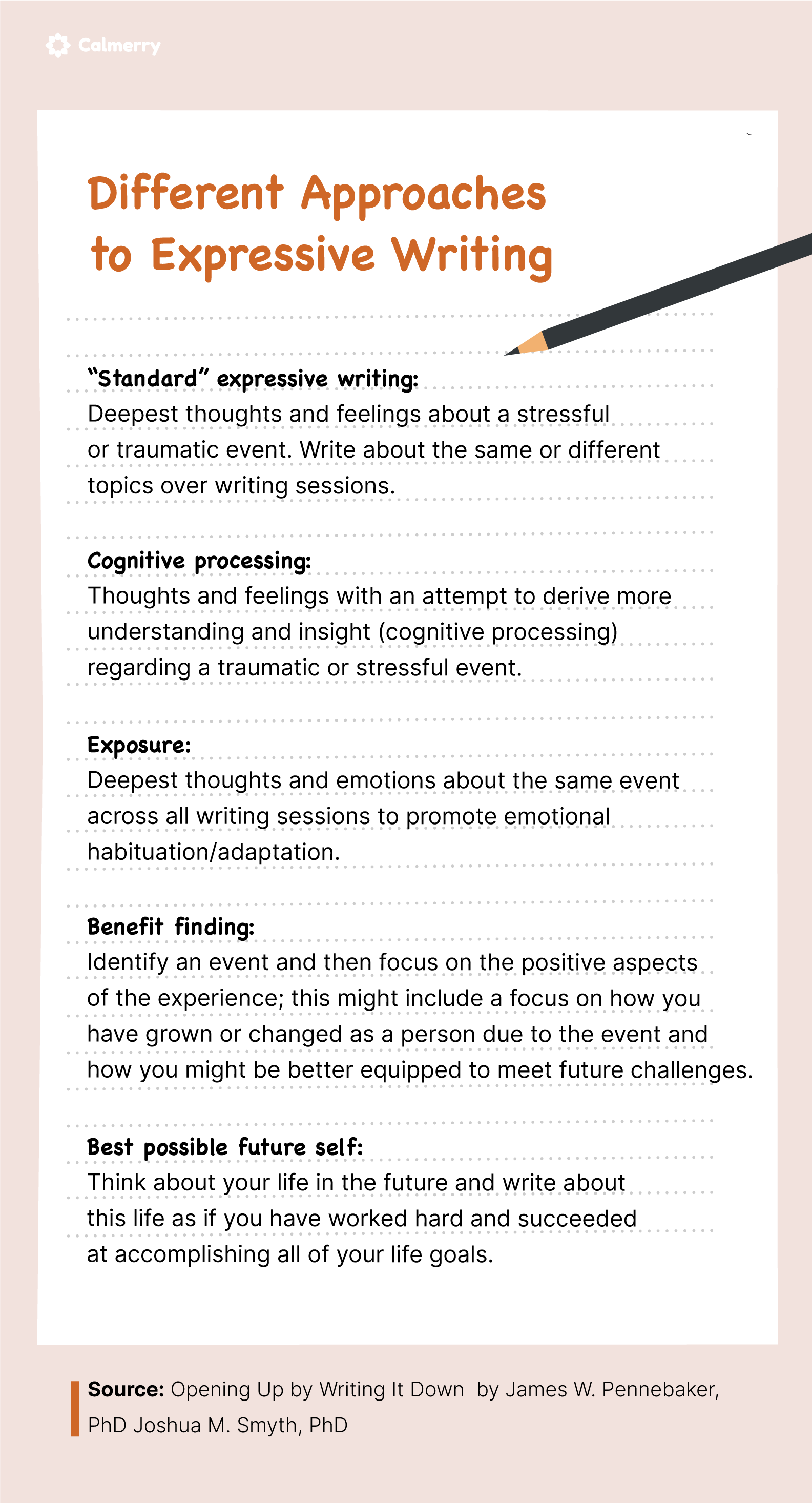
Keep in mind that although expressive writing is an effective emotional outlet, it isn’t an easy type of journaling, and the short-term effects may be an increase in distress, sadness, and fatigue. But it’s only temporary discomfort, and it will go away soon, so you should push through. It’s well worth the struggle, and its long-term health benefits are life-changing.
It’s important to note that expressive writing and other types of journaling don’t replace therapy. Writing complements it when done gently. If you feel you are struggling, it may be good to talk to a mental health professional who can support you and help you manage negative emotions.
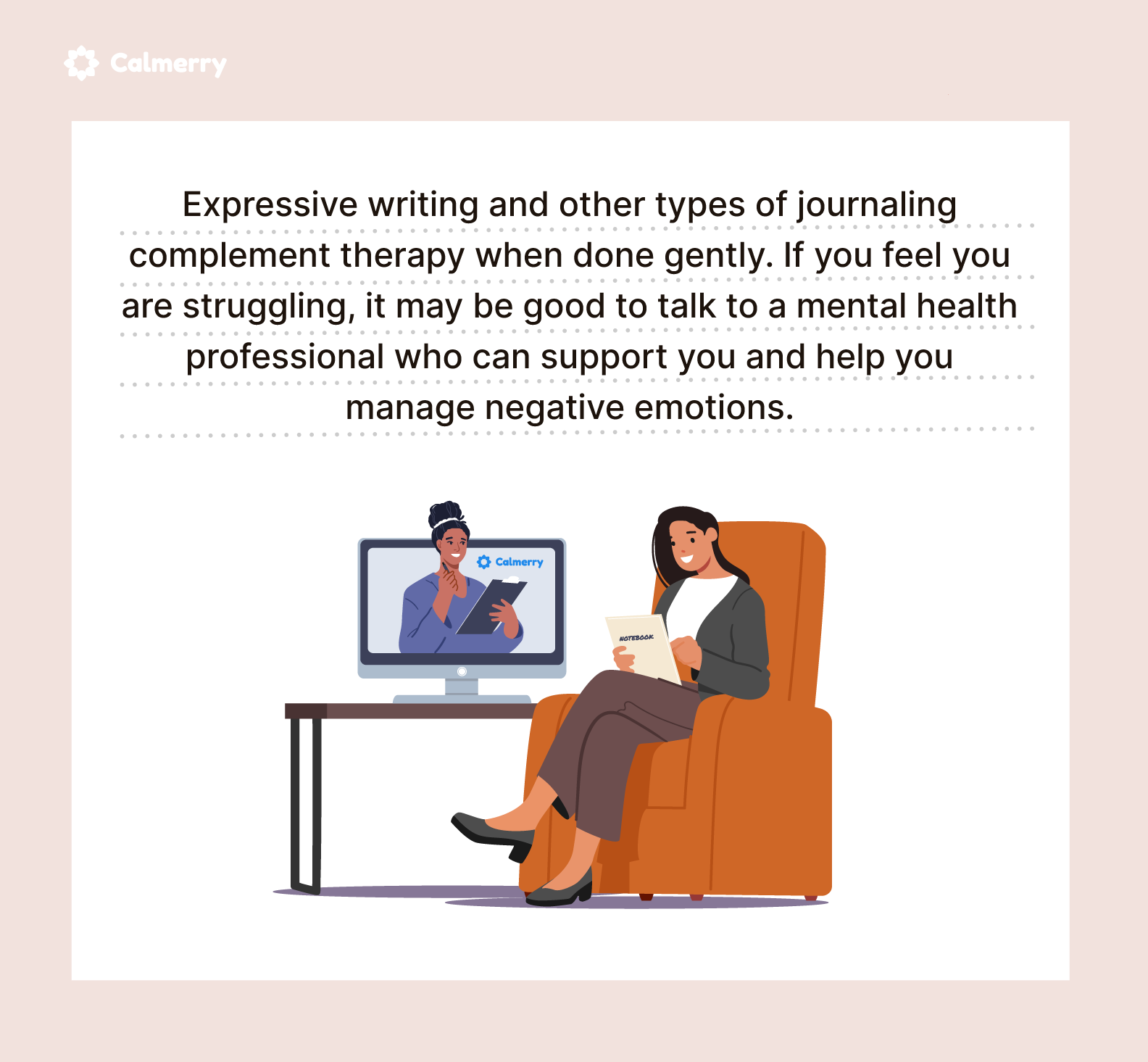
7 additional tips for journal writing to keep in mind
Journaling is a great tool to practice self-care because you don’t need any special tools or skills for it, you can do it at any time, and it can make you happier and healthier. Besides, it’s a very simple, yet flexible technique to address a variety of needs and preferences.
When it comes to journaling and specifically expressive writing, there simply aren’t any rules. You don’t have to worry about proper spelling, grammar, punctuation, and penmanship. These things don’t matter. And you don’t have to practice journal writing every day or at regular intervals. The only thing that matters is whether you’re satisfied with the results you’re getting.
Experiment and see what works for you
There is no one true way to write. You may write for as little as 2 minutes and as long as half an hour, and that can be beneficial. If you want, you may even write multiple times on the same day. You may try different techniques, writing instruments, approaches, and schedules until you find something that works for you.
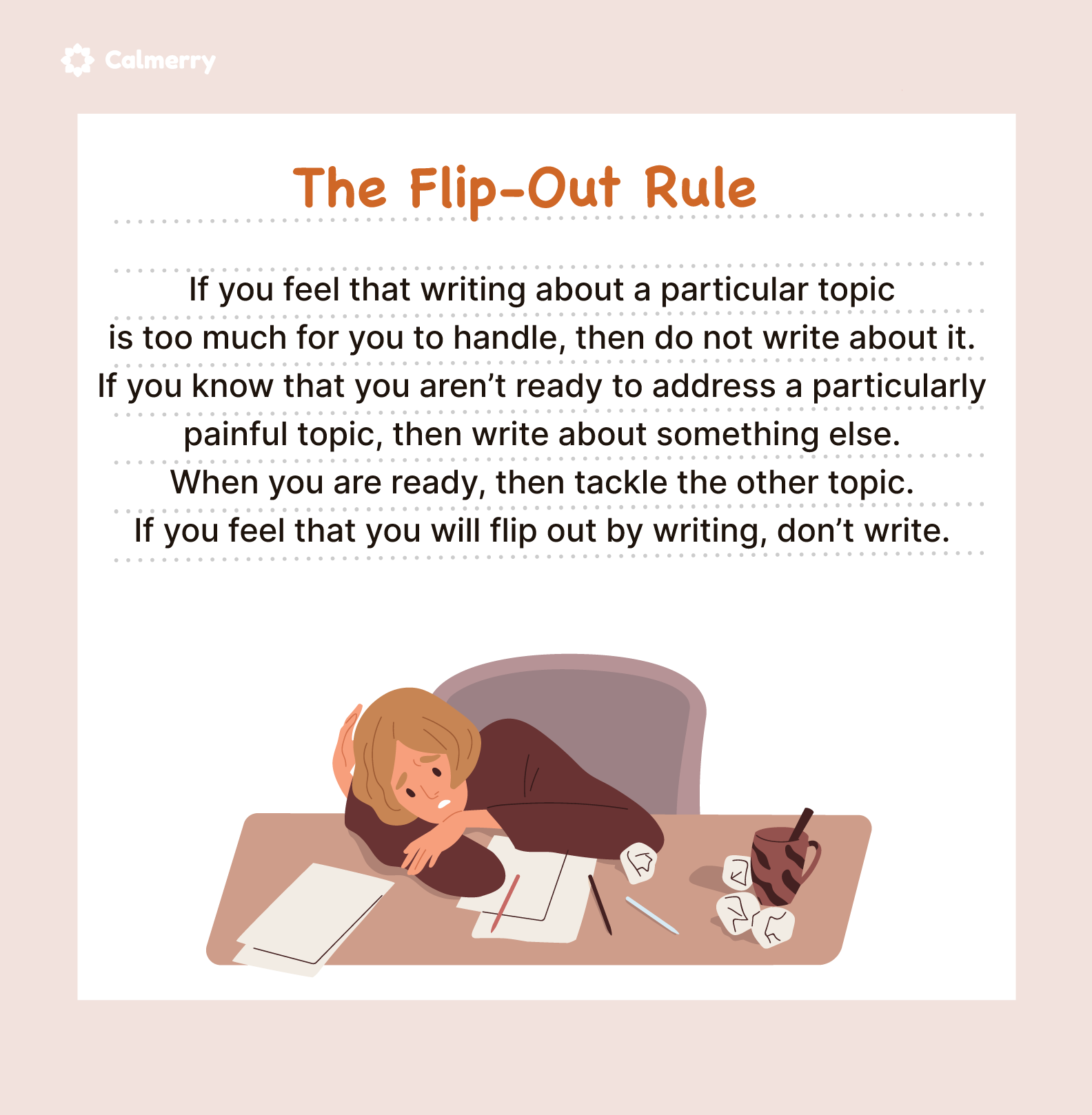
Date every journal entry
It’s an excellent habit to develop because it allows you to notice the cycles, patterns, and trends in your thoughts and feelings. And if you prefer to file your journal entries in a loose-leaf binder, dating every entry allows you to chronologically reconstruct your journal by date.
Keep everything you write because even unfinished entries can provide significant information about your personality. It can help you get an insight about your life and see the entire process. You should get into the habit of filing every last scrap of paper you write on. You can always go back and edit out the entries that clutter your journal.
Write quickly
Such a technique helps to quickly increase spontaneity and remove mental blinders. It can also help you prevent the writer’s block. When you write quickly, it engages the left part of your brain, which is responsible for analytical thinking and making judgments. At the same time, it frees the right part of your brain, which is responsible for creativity and imagination. As a result, you’re less likely to think consciously about what you’re writing and are more likely to reveal intuitive, subconscious information.
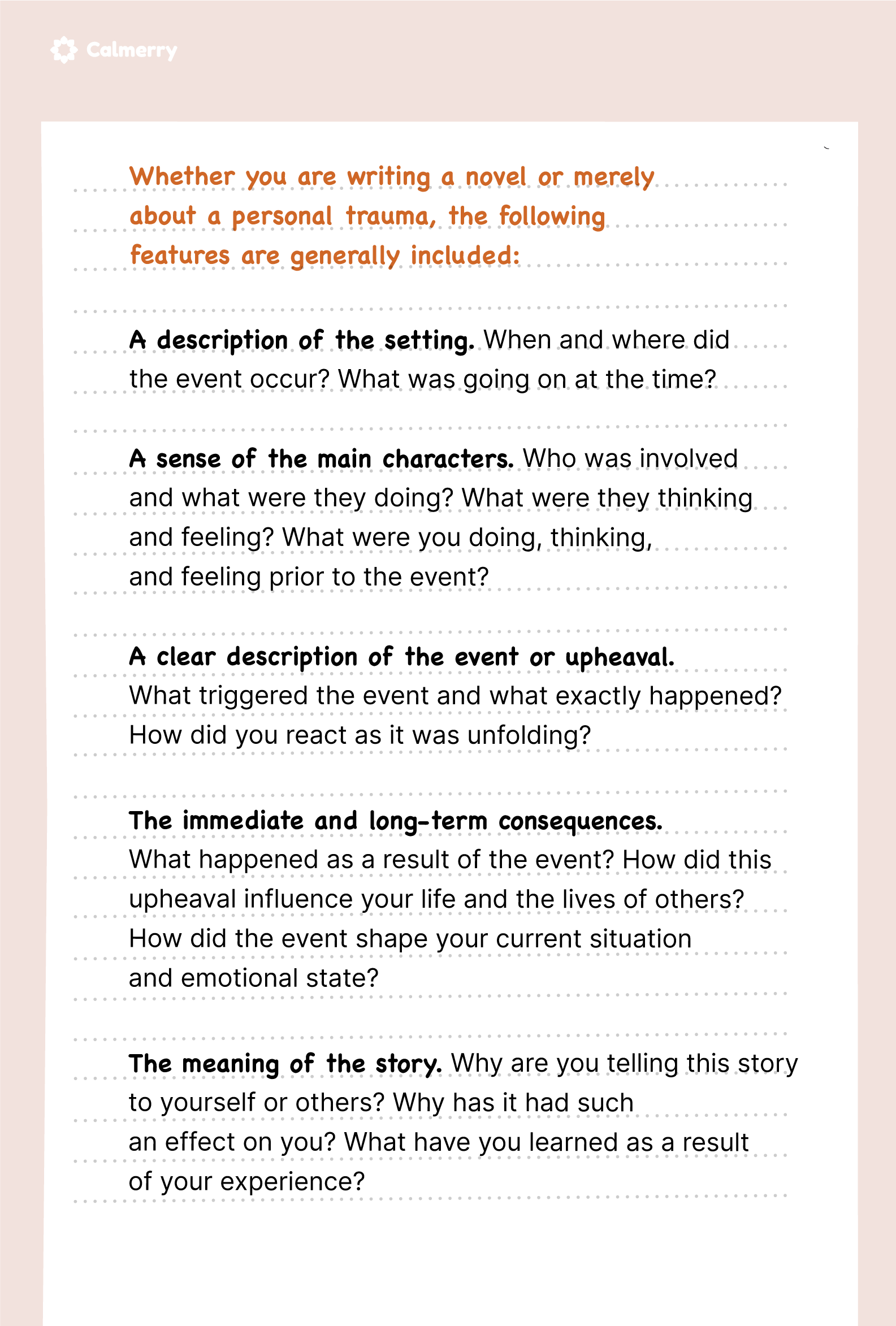
Just begin and keep writing
Don’t waste your time sitting with a blank page and thinking over and over again about what to write, how to write it, whether it’s exactly what you want to say, and whether it will sound right. In fact, it doesn’t matter where you begin – with the ending, with the question, with the date, with your current mood, with a list. Just get started, and your intuition will lead you where you really want to be.
Indulge your creative side
Writing isn’t the only way to express yourself – you can use dancing, singing, painting, acting, and other forms of art to get a grip on emotional upheavals. We encourage you to try to express your emotional experiences in the past through fiction writing (creating imaginary stories), experimenting with poetry, drawing, or painting.

You don’t need to limit yourself to traditional art forms. There are people who prefer to express their thoughts and feelings through gardening, woodwork, sewing, cooking, or playing with sand. But whatever you choose to do, it’s better to write about this activity afterward. When you put emotional experiences into words, it helps provide an additional structure to an experience that can have long-term benefits.
Express your feelings faster
Anger, fear, and grief are pure human emotions. It’s how you deal with them that makes them destructive or productive. Your journal is the perfect place to ventilate and tell the complete truth about yourself. Make a ritual of moving your negative emotions out of your body through writing, and that can save you from negative effects of stress – headaches, stiff neck, tight muscles, or a heart attack. Acknowledging your difficult emotions and dealing with them constructively are the first steps to making a positive change.
Try transactional writing
This type of writing is more formal than expressive writing, although it can be personal in content. The purpose of transactional writing is to complete an exchange of thoughts, beliefs, and feelings with someone else. You can write a letter to yourself or consider other people as your audience, for example, your family member, friend, significant other, or an authority figure.
- You may imagine that someone you love had suffered trauma and write a compassionate letter to them with a piece of advice based on your own experience.
- You may compose an empathetic letter to yourself or to someone else involved in the distressing event. The goal of this letter is to understand how this person feels about their experience.
- You may write a gratitude letter to someone in your life and thank them for something they taught you, gave you, or have inspired in you.
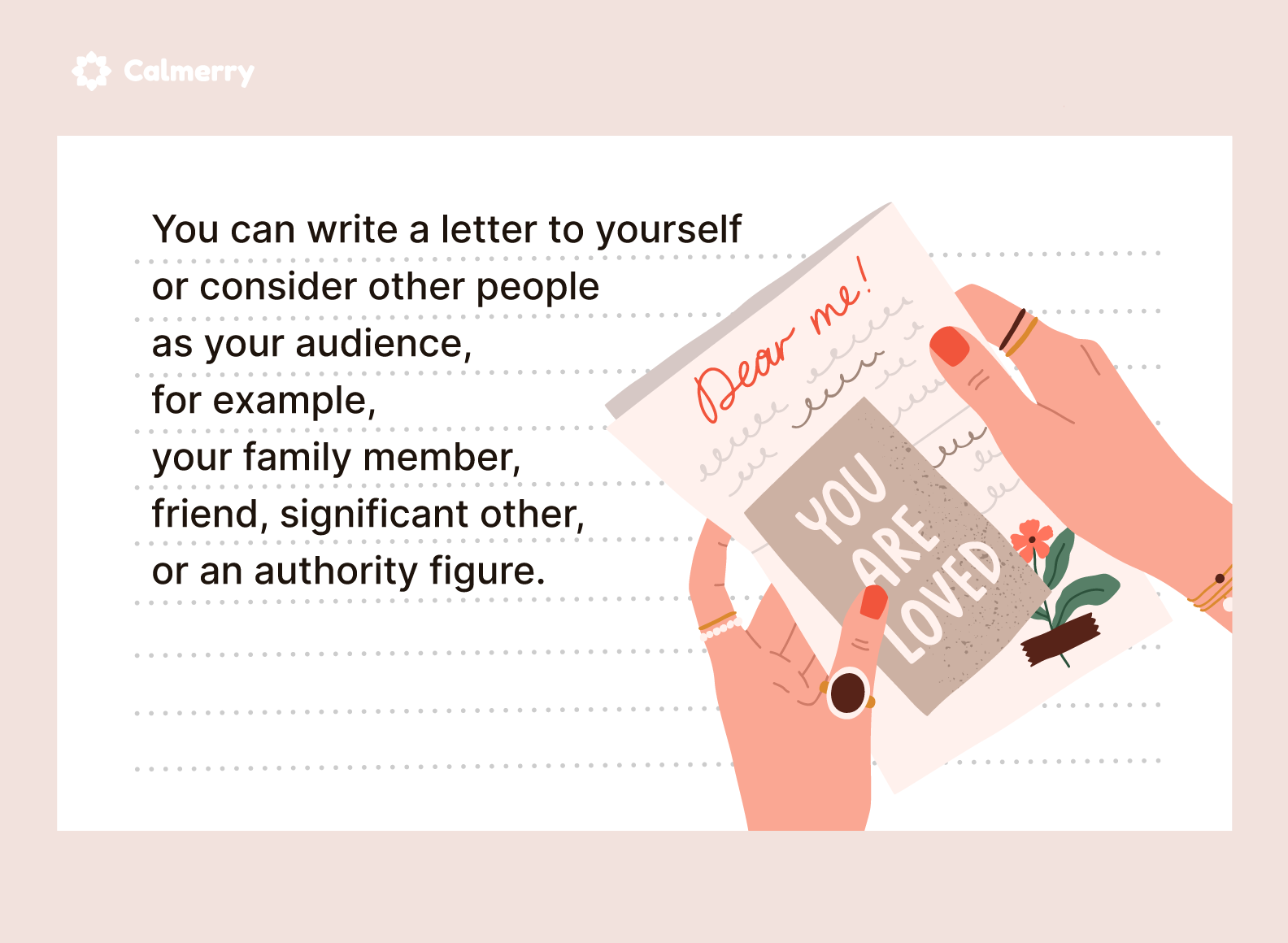
Protect your own privacy
What if someone will read your journal without permission? Perhaps it’s the most common concern about journal writing. Journal is a private book that contains a collection of your innermost feelings and thoughts. It’s quite natural to have the fear that someone could read it because it’s actually like having someone read your mind.
But it’s your responsibility to protect your own privacy, and you can do it in many different ways. First of all, you should find a storage place for your journal or always carry your journal with you. Then you’ll be able to write whenever you want, wherever you are. You can also tell other members of the household that you would appreciate it if they would respect your privacy by not reading your journal without your permission.
Write naturally
Remember, there are no rules for journal writing, so you can do everything that works for you. That means you can write what you want and how you want when the mood strikes and stop writing when the mood shifts. Write for yourself. Do not worry about punctuation, spelling, and grammar. Don’t try to find the perfect words or sentences at the start. Just write your thoughts, and don’t pause to edit the sentences.
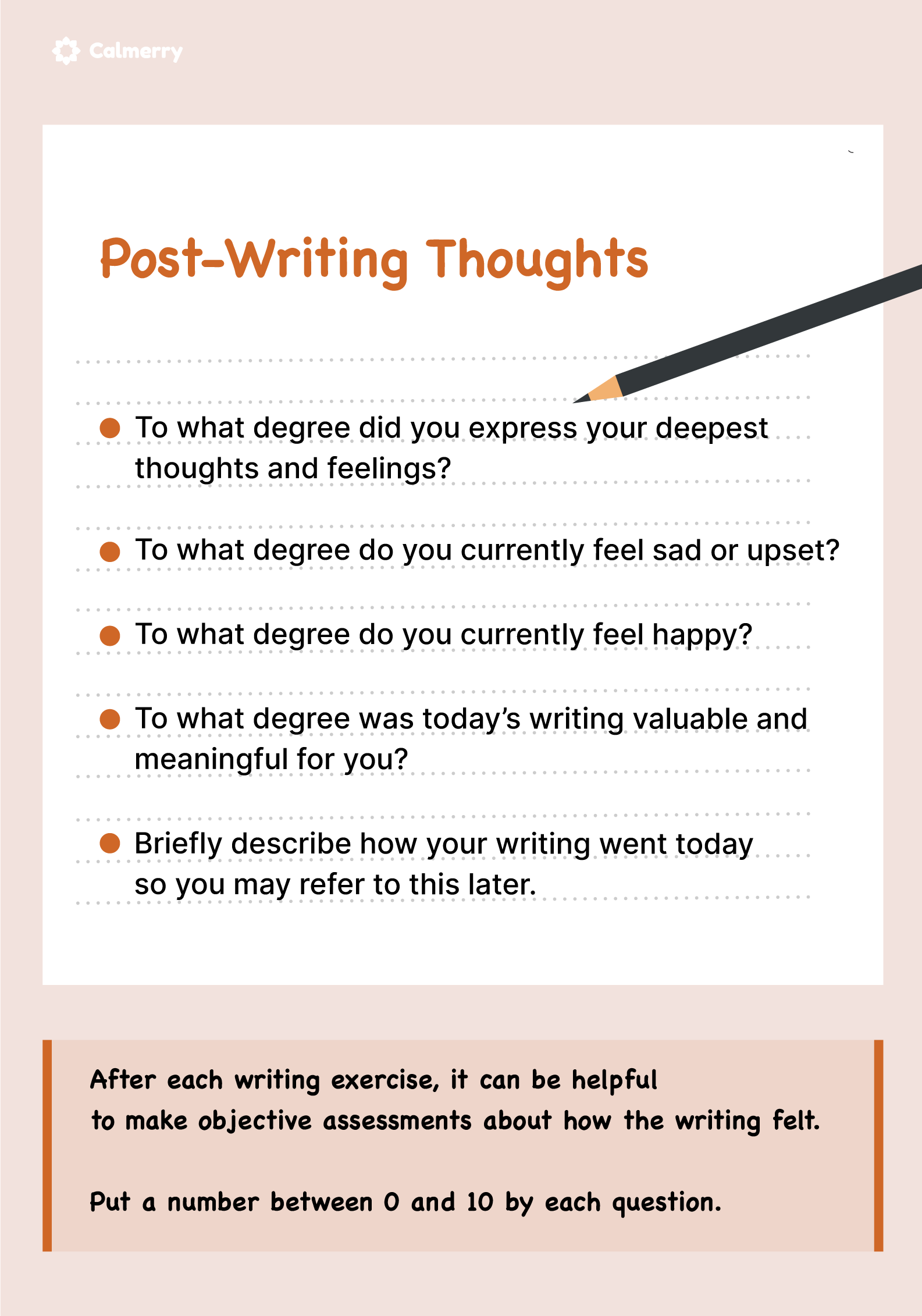
Final thought
Expressive writing is often used in therapeutic settings to help cope with trauma, stress, depression, and anxiety. Your therapist may set an expressive writing task as homework, or you can do it during a session. But it’s also an activity that anyone can do on their own as a self-improvement practice.
Writing about your thoughts and feelings helps emotionally process something difficult, gain insight into what is at the heart of the issue, and achieve greater peace of mind. So if you are now going through a tough time mentally or something is troubling you, I highly encourage you to give expressive writing a try to make sense of your thoughts and emotions. Consider exploring this therapeutic practice with Calmerry, where you can find support and guidance on your journey to emotional well-being.
online therapy
live video session


